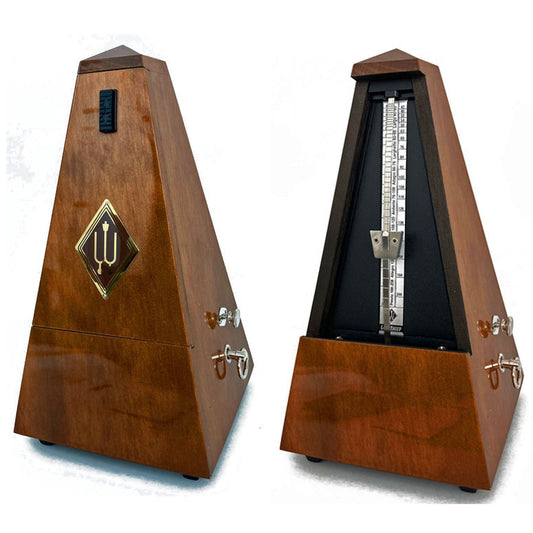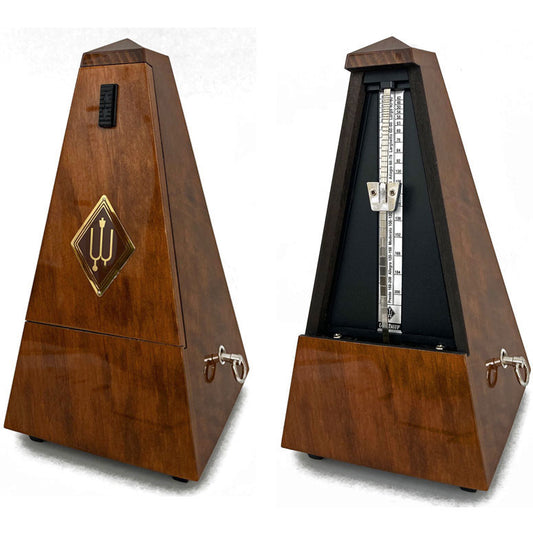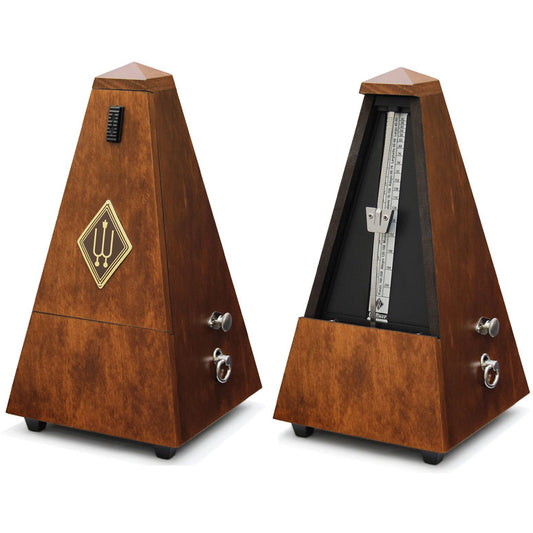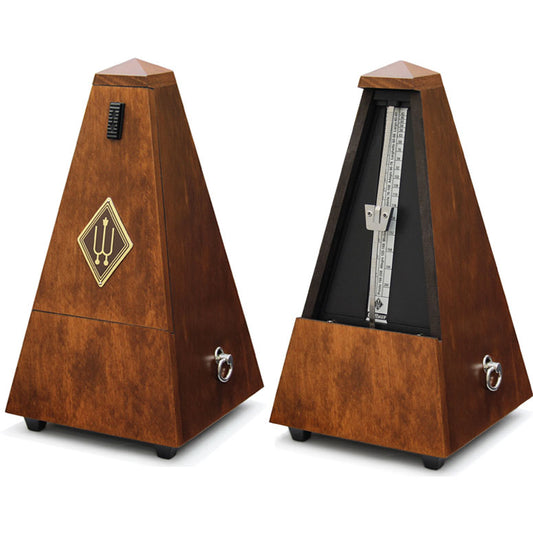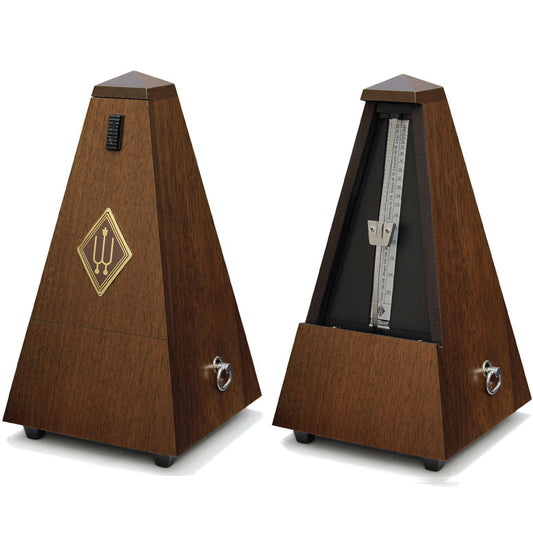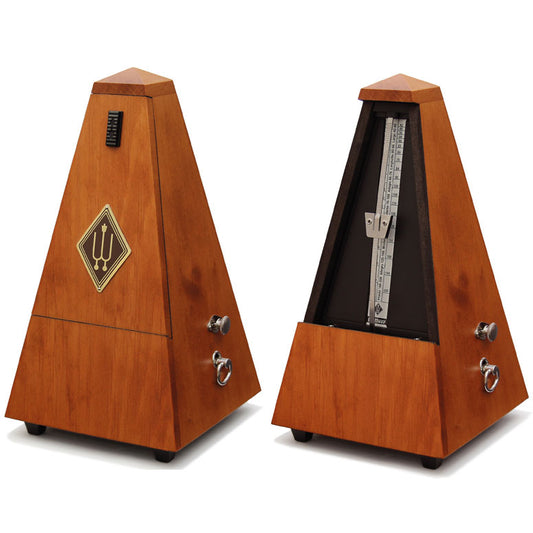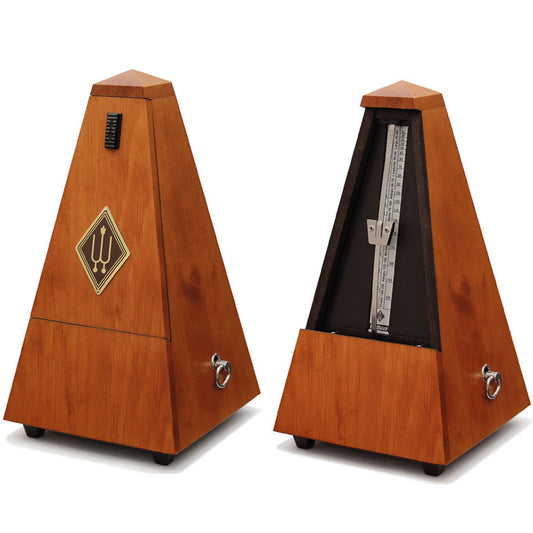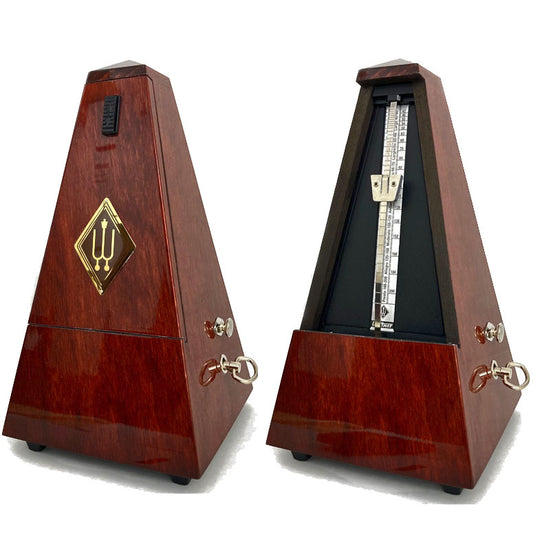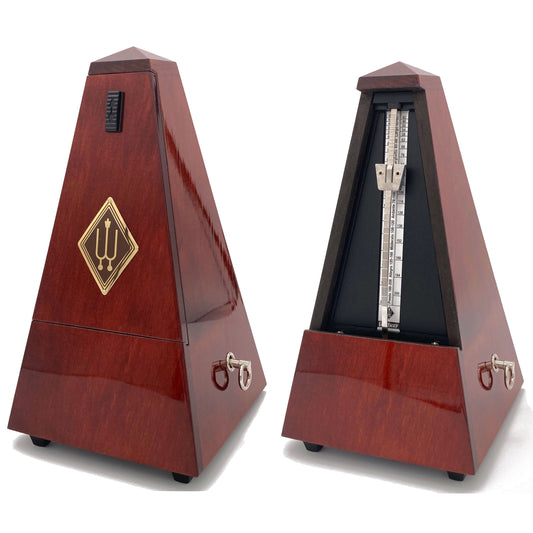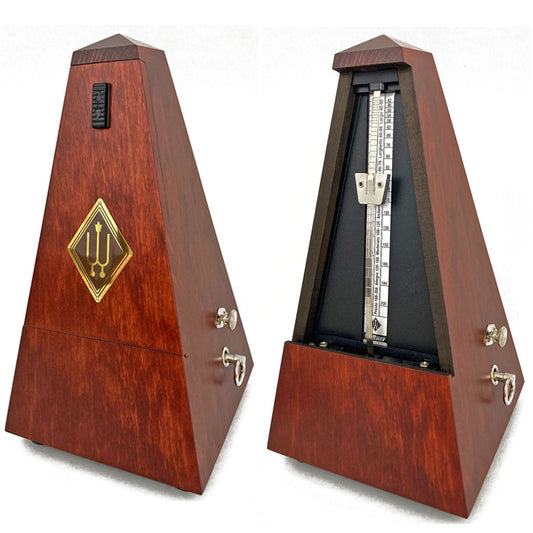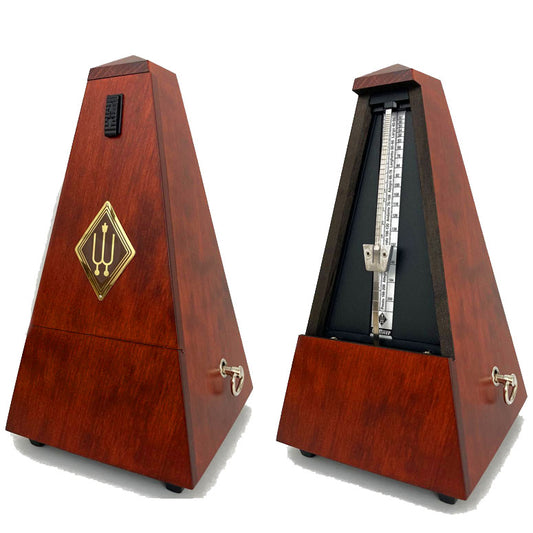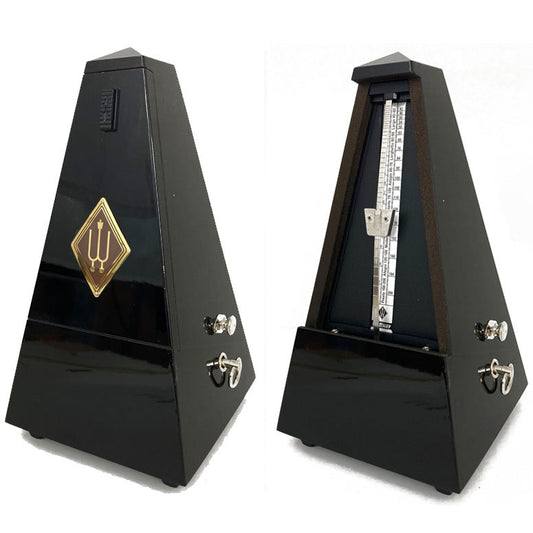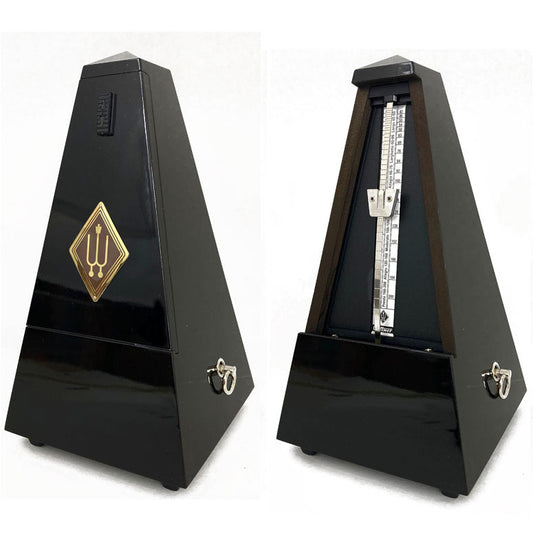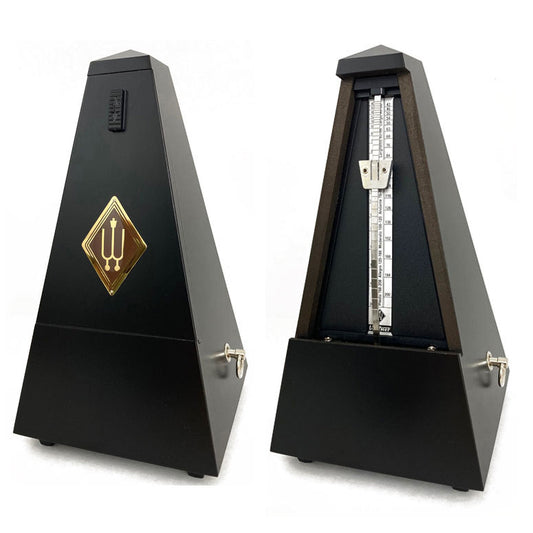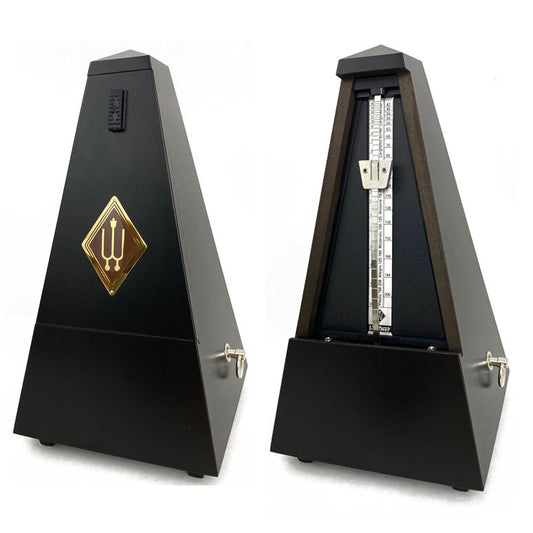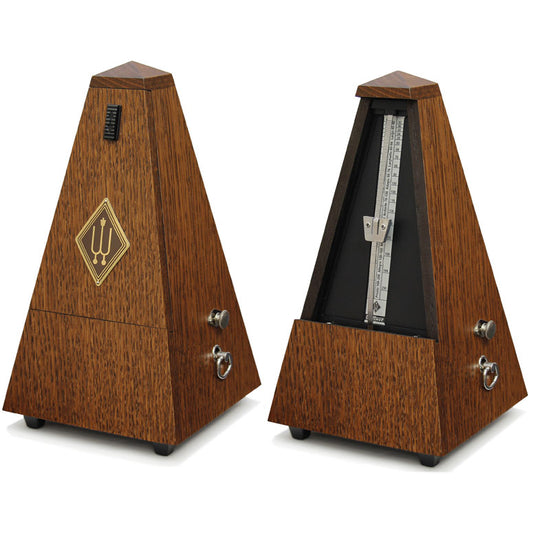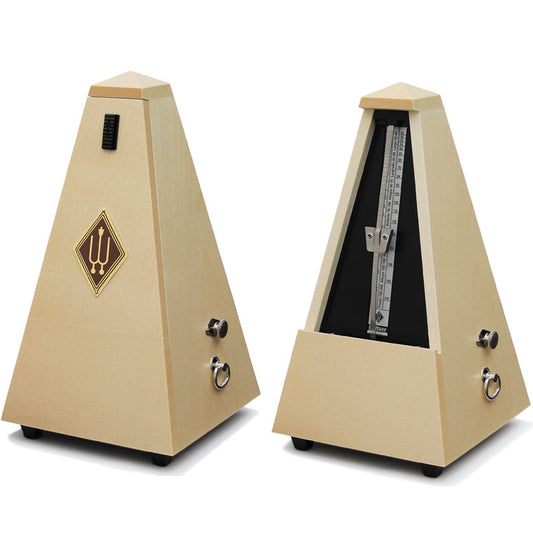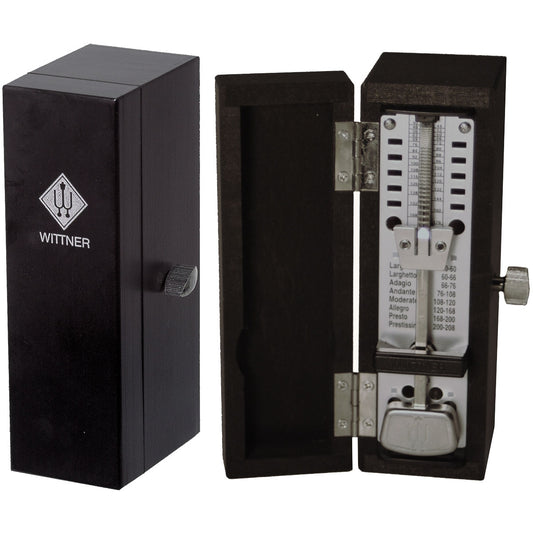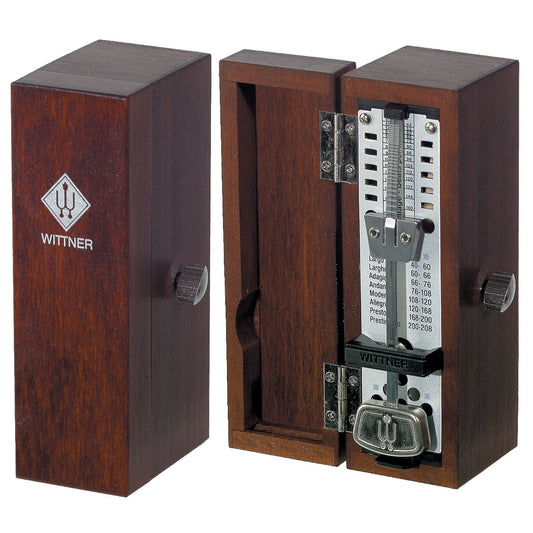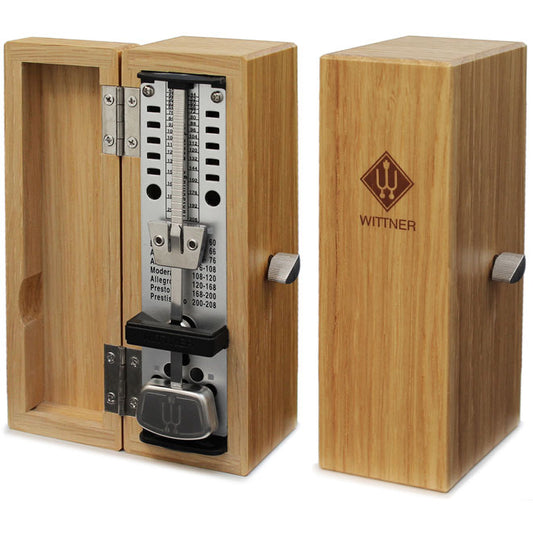-
Wittner Maelzel Solid Wood Metronome - Walnut - High Gloss - With Bell - Model 813
Regular price $234.99Regular priceUnit price per -
Wittner Maelzel Solid Wood Metronome - Walnut - High Gloss - No Bell - Model 803
Regular price $229.99Regular priceUnit price per -
Wittner Maelzel Solid Wood Metronome - Walnut - Matte Finish - With Bell - Model 813M
Regular price $189.99Regular priceUnit price per -
Wittner Maelzel Solid Wood Metronome - Walnut - Matte Finish - No Bell - Model 803M
Regular price $179.99Regular priceUnit price per -
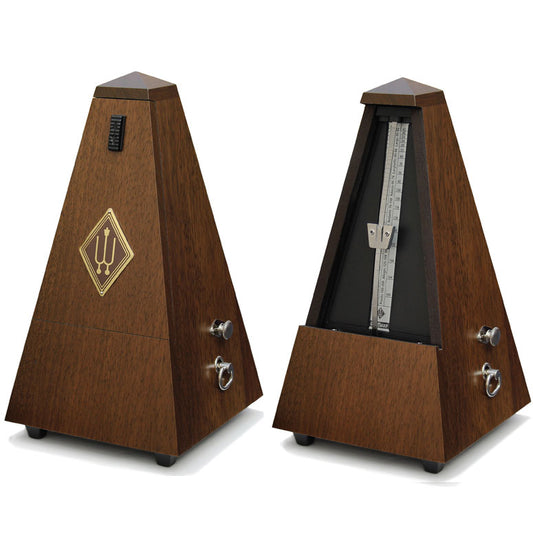
Wittner Maelzel Solid Wood Metronome - Genuine Walnut - Matte Finish - With Bell - Model 814M
Regular price $200.99Regular priceUnit price per -
Wittner Maelzel Solid Wood Metronome - Genuine Walnut - Matte Finish - No Bell - Model 804M
Regular price $199.99Regular priceUnit price per -
Wittner Maelzel Solid Wood Metronome - Cherry - Matte Finish - With Bell - Model 811MK
Regular price $199.99Regular priceUnit price per -
Wittner Maelzel Solid Wood Metronome - Cherry - Matte Finish - No Bell - Model 801MK
Regular price $189.99Regular priceUnit price per -
Wittner Maelzel Solid Wood Metronome - Mahogany - High Gloss - With Bell - Model 811
Regular price $234.99Regular priceUnit price per -
Wittner Maelzel Solid Wood Metronome - Mahogany - High Gloss - No Bell - Model 801
Regular price $229.99Regular priceUnit price per -
Wittner Maelzel Solid Wood Metronome - Mahogany - Matte Finish - With Bell - Model 811M
Regular price $189.99Regular priceUnit price per -
Wittner Maelzel Solid Wood Metronome - Mahogany - Matte Finish - No Bell - Model 801M
Regular price $179.99Regular priceUnit price per -
Wittner Maelzel Solid Wood Metronome - Black - High Gloss - With Bell - Model 816
Regular price $234.99Regular priceUnit price per -
Wittner Maelzel Solid Wood Metronome - Black - High Gloss - No Bell - Model 806
Regular price $229.99Regular priceUnit price per -
Wittner Maelzel Solid Wood Metronome - Black - Matte Finish - With Bell - Model 816M
Regular price $189.99Regular priceUnit price per -
Wittner Maelzel Solid Wood Metronome - Black - Matte Finish - No Bell - Model 806M
Regular price $179.99Regular priceUnit price per -
Wittner Maelzel Solid Wood Metronome - Genuine Oak - Matte Finish - With Bell - Model 818
Regular price $199.99Regular priceUnit price per -
Wittner Maelzel Solid Wood Metronome - Genuine Maple - Matte Finish - With Bell - Model 817A
Regular price $199.99Regular priceUnit price per -
Wittner Taktell Super Mini Solid Wood Metronome - Black
Regular price $159.99Regular priceUnit price per -
Wittner Taktell Super Mini Solid Wood Metronome - Mahogany
Regular price $159.99Regular priceUnit price per -
Wittner Taktell Super Mini Solid Wood Metronome - Genuine Oak
Regular price $159.99Regular priceUnit price per
Frequently Asked Questions
Are these metronomes made of real/solid wood?
Yes, the exterior of all the metronomes on this page are crafted from real, solid wood.
What’s the difference between the “Genuine” wood metronomes and the others?
The standard Wittner models are made of seasoned lumber that is locally available to the Wittner shop in Germany – chiefly from Alder and Poplar trees. This solid wood is then given a beautiful Walnut, Cherry, or other stain. The “Genuine” models are made from the wood of the named tree – i.e. the “Genuine Oak” metronome is made from the seasoned wood of an Oak tree.
Should I pick the high-gloss or matte version?
This is purely a matter of personal taste and the décor of the room where the metronome will be displayed. Some customers prefer the mirror-like, reflective, high-gloss version, which has a deep, beautiful, glossy shine, not unlike that of a well-varnished violin. But, the non-gloss, matte-finished metronomes
have a beauty of their own, which some prefer. Consider matching the stain and finish of the piano on which the metronome will be placed.
Which color/style should I pick?
Again, we recommend selecting the color/style that looks good to you, and that you think will match well with the piano/table on which the metronome will be placed. They are all beautiful, so you can’t really go wrong.
Should I choose a “bell” version?
The optional “bell” is a real, metal bell, placed within the metronome housing. These models have a control lever, on the right side, above the winding key, that allows the user to set the bell to chime at the beginning of every measure (in various time signatures), or to turn the bell off. The bell is primarily used by teachers, to help their students understand the emphasis of the down beat. It is otherwise used infrequently. If you don’t feel you need the bell, we recommend purchasing the non-bell version, for two reasons: 1) It’s less expensive. 2) The version with the bell can sometime still make a very soft, subtle, tap on the muffled bell, even when it is turned off. It is often completely inaudible. But, sometimes a very discerning listener will notice the sound. This is normal, and part-and-parcel of a purely mechanical construction. But, if you’re not going to use the bell anyway, and worry that the sound will bother you, best to purchase the version without the bell.
Is the tick-tock sound loud enough/too loud for my needs?
Most players can hear the click sound over the sound of their instruments (i.e. violin, piano) with no difficulty. Yet, the sound is not overpowering and does not seem excessively loud, heard on its own. The percussive click is relaxing, much like a clock. (Indeed, many customers purchase these metronomes as an aid to sleep and/or to help relax children with sensory processing differences.) Yet, it cuts through, and does not get “lost” in, the sound of most instruments. These mechanical metronomes have the distinct advantage over electronic metronomes, in that the player can not only hear the tick, but also see the motion of the pendulum for an indication of the tempo. The Maelzel metronomes are slightly louder than the smaller Taktell models.
Do you have these metronomes in stock?
If the model does not show, "sold out," then we have it physically in-stock, and available for immediate shipment. If it shows, "sold out," then we'll likely have it back in stock within a week or so.
See the product description of each metronome for additional Q&A.
Review of Maelzel & Taktell Mini Solid Wood Metronomes
Hi everyone,
Jim Fisher, from Fisher Violins. We're looking today at Wittner's solid wood, mechanical metronomes. Wittner is a 3rd generation, family-owned company. It was founded by a watch maker in 1895 in Germany. They have a well-established reputation for accuracy and reliability. These are mechanical metronomes. They have no batteries, wires, or electronics. They are not time pieces. They do not have quartz crystals, like a watch would have.
So, when I say that they have a reputation for accuracy, I'm talking about the precise design, manufacturing, and assembly of gears and moving parts needed for a metronome to tick accuratly and consistently, year after year, in humid and dry conditions alike, to within a few ticks-per-minute of the desired setting. If you’d like to confirm the accuracy of your metronome, you can do so by using a stopwatch and counting the number of ticks in the given time. Please note that trying to compare your metronome’s ticking to the ticking of another metronome will not work.
If you just need a tempo, there are dozens of metronome apps available to download to your phone, for free. People purchase a Wittner because they're looking for something more. Something that is going to not only be functional and reliable, but also add to the ambiance of the room in which it is placed. These metronomes are crafted from solid wood - not veneer or particleboard, and they have the advantage of giving the musician a visual indication of the tempo, in addition to the audible click.
The Maelzel style, or pyramid style, is 8 1/2 inches tall and weighs a little under 17 oz. It ships with the winding key hidden in the base, here, which must be threaded onto the winding screw - you may need to adjust the angle a bit when threading the key onto the shaft. Then, just slip the pendulum out from behind the stationary position, bring up the pendulum weight to set your desired tempo, and start it ticking. Note that the metronome must be places on a level surface for the tempo to be even and accurate.
In the Maelzel style, you have several options to choose from. First, there is the choice of wood and stain. The Mahogany, Cherry, Walnut, and Black models are made from hardwoods that grow locally in Germany, usually Alderwood or Poplar, and are given a beautiful Mahogany, Cherry, or Walnut stain, or painted black. Then, we have then "Genuine" Walnut, which is made from the wood of a Walnut tree. It's a bit darker in color than the Walnut-stained model. There is also the Genuine Oak, which likewise is made from the wood of an Oak Tree, and the Genuine Maple, made from the wood of a Maple tree.
Many of the wooden maelzel metronomes also come with a choice of matte or high-gloss finish. The high-gloss has a mirror-like, highly reflective look. The matte finish is just as attractive, but with a natural wood look. Customers often look to match the wood and finish choice to the piano or other surface on which the metronome is to be displayed.
Lastly, there is the choice of bell or no bell. The bell is an actual, metal bell, housed within the metronome workings, and it can be set to chime on the first beat of each measure, or turned off when not needed. There is a mechanical lever on the side of the metronome to control the bell, which can be set to chime every 2, 3, 4, or 6 beats, or turned off. The bell is a popular item with teachers, who use it to help their students emphasize the down beat. Musicians buying just for their own use usually don't need it. If you don't intend using the bell, we recommend buying the non-bell version. For one thing, it's less expense. For another, we’ve found that sometimes, even when the bell is turned off, a very faint tap on the bell can still be heard. It's hardly noticeable, and often not audible at all. But, if you're not going to use the bell, and if you think that very faint sound might bother you, best to just buy the non-bell version.
Customers sometimes are surprised to find that the interior housing and working parts, under the wood panels, are not made entirely of metal and wood. Where strength is required- for example, the brace that holds the exterior wood panels in place, metal is used. But, if you want your metronome to work consistently and accurately, over the course if a lifetime, without maintenance, then you don’t want the gears to be made of metal. Metal expands and contracts with temperature variations. Wood does the same with changes in humidity. Instead, Wittner uses a high quality, high density composite material for these working parts. The black background, here, behind the pendulum, The cover on the bottom, here, and the latch on the cover, are also made of the same composite material.
Lastly, we have the wittner taktell mini mechanical metronomes. These are fantastic little devices. Again, no batteries or electronics, and a much simpler and smaller design. Unlike the larger maelzel metronomes, these can take a bit of abuse. I’ve had one rattling around in the interior pocket if my violin case for 20 years and it still functions perfectly. We do carry these in both solid wood and plastic. You won't get them confused - the plastic are clearly made of plastic - they are not made to look like wood, as the plastic Maelzel metronomes are. Be cautious, by the way, if shopping at other sites. We don't carry the plastic Maelzel metronomes, but they do make them. And, they are made to look like the wooden metronomes. So, read the description carefully, if wood is what you're looking for.
We ship these metronomes from here in Pennsylvania. If our site lets you order it, then we have it phically in stock and ready to ship to you. If your chosen model says out if stock, we’ll usually have more within a week or two and would be hapoy to let you know, with no ibligation, when they are back in - just send us an email and ask.
I hope this information is helpful to you. If you have any questions, please don’t hesitate to ask. We generally reply to email inquiries within a day. My name is Jim Fisher, from JS Fisher Violins, and you can find us on the web at fisherviolins.com.

